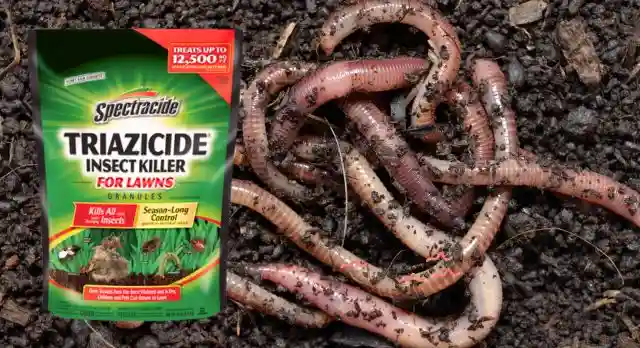Does Triazicide Kill Earthworms? Understanding the Impact
Triazicide is a commonly used insecticide for controlling various pests in lawns and gardens. However, many people are concerned about its impact on earthworms, which play a vital role in soil health and ecosystem balance. In this comprehensive guide, we will explore the effects of Triazicide on earthworms, potential risks, and alternative approaches to consider for a harmonious environment.
Does Triazicide Kill Earthworms?
The short answer is that Triazicide can have an impact on earthworms. Triazicide contains chemical ingredients, such as gamma-cyhalothrin, which are effective against a wide range of insects but can also affect non-target organisms like earthworms. However, the extent of the impact depends on various factors, including the specific product used, application methods, and environmental conditions.

What is Triazicide?
Triazicide is a commonly used insecticide that contains the active ingredient called gamma-cyhalothrin. It is marketed as an effective solution to control a wide range of garden pests, including ants, grubs, mosquitoes, and various beetles. Gardeners often turn to Triazicide to protect their plants from damage caused by these pests and to ensure a healthy garden.
Understanding the Impact on Earthworms
Earthworms are essential for soil health as they aerate the soil, improve its structure, and enhance nutrient cycling. When Triazicide is applied to lawns or gardens, the chemicals can come into contact with earthworms, potentially leading to adverse effects:
Direct Toxicity: The chemical ingredients in Triazicide, such as gamma-cyhalothrin, can be toxic to earthworms. These chemicals can affect the nervous system of earthworms, leading to paralysis or death.
Disruption of Soil Ecosystem: Earthworms are crucial for maintaining the balance of the soil ecosystem. Their decline can disrupt the soil structure, nutrient availability, and overall soil fertility.
Indirect Effects: Triazicide is primarily designed to target specific pests, but it can also affect other beneficial insects and organisms that are part of the natural ecosystem. This disruption can have cascading effects on the broader environment and wildlife.
Alternative Approaches for Pest Control
If you are concerned about the impact of Triazicide on earthworms and want to maintain a healthy environment, there are alternative approaches you can consider:
Integrated Pest Management (IPM): IPM is a holistic approach to pest control that focuses on prevention, monitoring, and targeted treatments. By using a combination of cultural practices, biological controls, and selective pesticide applications, you can effectively manage pests while minimizing harm to beneficial organisms like earthworms.
Natural Remedies: Explore natural remedies and organic alternatives for pest control. These can include using botanical insecticides derived from plant extracts, such as neem oil or pyrethrin, which are generally considered safer for non-target organisms like earthworms.
Cultural Practices: Implement cultural practices that discourage pest infestations. These include regular lawn maintenance, proper watering, promoting biodiversity, and removing pest-attracting conditions, such as excessive thatch or overgrown vegetation.
Key Considerations for Triazicide Application
If you choose to use Triazicide for pest control despite the potential impact on earthworms, it’s important to take the following considerations into account:
Read and Follow Instructions: Carefully read and follow the instructions provided by the manufacturer. Use the product as directed, including the recommended application rate, timing, and frequency.
Spot Treatment: Consider spot-treating specific areas where pest infestations are most severe rather than applying Triazicide across the entire lawn or garden. This targeted approach can help minimize the overall impact on earthworms and other beneficial organisms.
Timing and Environmental Factors: Apply Triazicide when the target pests are most vulnerable, following the guidelines provided by the manufacturer. Consider environmental factors like weather conditions to minimize potential drift or runoff that could affect non-target organisms.
Key Takeaway
Triazicide can have an impact on earthworms due to its chemical ingredients, potentially causing direct toxicity and disrupting the soil ecosystem. If you are concerned about the impact on earthworms, explore alternative approaches like integrated pest management, natural remedies, and cultural practices for pest control. If you choose to use Triazicide, follow the manufacturer’s instructions, spot-treat affected areas, and consider timing and environmental factors to minimize the impact on earthworms and maintain a healthy environment. Remember, a balanced ecosystem is crucial for the overall health and vitality of your lawn or garden.
